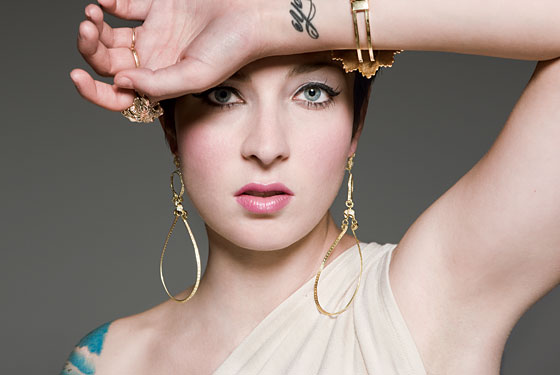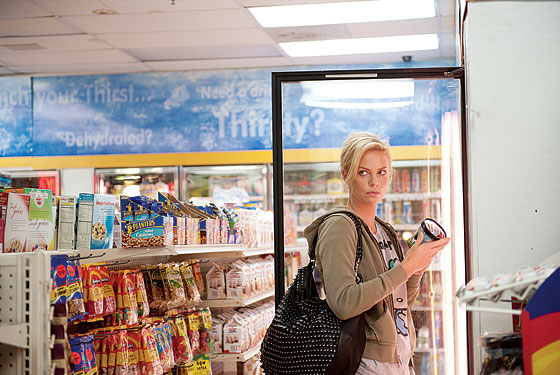
‘I can’t believe Tony Danza is here!” Diablo Cody is shrieking, impishly, at an after-party for her new film, Young Adult, which is being held in the dark, triangular meatpacking-district nightclub the Double Seven. The cast—Charlize Theron, Patton Oswalt—director Jason Reitman, and celebrities like Jeremy Renner and Courtney Love are milling about the bar, which is staffed by skinny women in corsets, but Danza is the one who has caused the screenwriter of Juno to lose her cool. Like a true child of eighties pop culture, Cody seems both ironically amused and genuinely geeked to be in the same room as the star of Who’s the Boss. After taking five minutes to revel in this fact—“We are listening to the same song as Tony Danza right now!”—she collects herself and goes over to speak with him. He is very happy to meet her. It is her party, after all.
Young Adult is a dark comedy starring Theron as a beautiful but shallow woman who returns to her hometown on a delusional mission to seduce her high-school boyfriend. It’s Cody’s second movie since Juno, the 2007 indie comedy about a slang-spewing pregnant teenager with a hamburger phone that was an unexpected hit, earning $143 million and making its previously unknown writer famous. Initial reviews of the film were rapturous, but some found its dialogue, full of stylized, cutesy wordplay like “honest to blog” and “homeskillet,” irritating and its portrayal of teen pregnancy—in which abortion wasn’t a reasonable option—romantic and unrealistic.
Cody, a straight-talking, highly quotable character in her own right, came to be seen as the embodiment of the film’s flaws, its intentionally, not incidentally, provocative avatar. A former blogger, she had previously written a memoir about her experiences as a stripper and renamed herself after the Devil (her real name is Brook Busey, she was born and raised outside of Chicago, and she went to Catholic school). By the time she won the Oscar for Juno at 29 (which she accepted in a leopard-print dress), the backlash was in full effect. Juno had made Cody not only just a rare thing—a screenwriter people have heard of—but that rarest of things: a screenwriter some people hate. “When you see people have written an ‘In Defense of … “Your Name,” ’ like you’re warranting a special essay by someone who’s a contrarian for liking you,” Cody says, referring specifically to “In Defense of Diablo Cody,” a piece that ran in Bitch magazine in 2008, “you’re fucked.”
She didn’t help herself a year later when Cody and three of her good friends—screenwriters Dana Fox, Liz Meriwether, and Lorene Scafaria—were profiled in the New York Times “Styles” section referring to themselves as the “Fempire,” drinking and writing together glamorously (typical detail: “Whenever one of them has a movie opening, they all rent a white limousine and go from theater to theater to watch the first audiences react”). Though Cody says the story was never meant to be taken seriously—“Obviously we don’t think of ourselves as any kind of empire”—its jokey superiority invited derision. Soon after, Cody’s 2009 film, the feminist slasher flick Jennifer’s Body, flopped.
Since then, Cody has pursued a lower-profile lifestyle. She got married and had a son in 2010. For two years, she ran Showtime’s recently canceled multiple-personality drama United States of Tara. “I regret the level of visibility that I had. If a person can regret anything more than 100 percent, I do,” she says over tea at the very un-Juno Bergdorf Goodman. “I think it’s great when writers get recognition; it doesn’t happen very often. I just don’t want that writer to be me. Let it be Aaron Sorkin or, you know, somebody good. I felt like I was rejected as a person. Like, that was the real me. Your whole life you suspect you’re unlikable, and I have proof. It sucks to get proof.”
And yet, Cody says she sometimes feels like she’s writing under the guise of the celebrity screenwriter named Diablo Cody. Theron’s character in Young Adult, Mavis Gary, is the ghostwriter of YA books (Cody is interested in all things YA: She’s been working on the screenplay for the movie adaptation of Sweet Valley High), and Cody identifies with the profession: “I feel like that all the time. I don’t feel like the real me, Brook, which is what all the normal people call me, has accomplished anything, because anything I’ve done that’s been successful has been attributed to this weird character.”
So she’s trying to rein in Diablo Cody. “There’s a weird cloud around you when you’re recognizable. It was a brief window for me. I think you have to have a pathological need for attention of any type, negative or positive, to thrive in that kind of situation. And I only want compliments. I’m like, ‘Fuck it, I’m going to go back to anonymity and surround myself with friends and family who will kiss my ass all day.’ Like, power and money are wonderful things. Fame is for crazy people.”

The problem, if it’s a problem, is that her Cody persona makes for such an entertaining famous person: engaging, thoughtful, sardonic. There’s a reason she, not the actors, was the standout of the Juno press tour. She has a version of the Women Who Give Great Interviews dilemma (see Megan Fox and Katherine Heigl for the high-grade variety): Because of the anodyne state of celebrity reporting, in which tabloids are propaganda arms for the Kardashians and celebrities are PR-ed up to within an inch of their lives, anyone who says anything interesting immediately opens herself up to criticism. Cody says interesting things all the time, and the edges haven’t always been sanded off, like when she tells me, “There’s probably no experience more alienating than fame, other than a terminal illness, where you actually find yourself in a situation that nobody around you can relate to.”
This penchant for spiky honesty is one Cody channels through Adult’s Mavis, whom she wrote as an utter narcissist, unfulfilled and lonely, alcoholic, and inconsiderate, in a state of hideous arrested development. “I felt like there were a lot of movies out there about the man-child. It had become a kind of genre unto itself,” Cody says, referring to the films of Judd Apatow and his peers, from Knocked Up to The Hangover. “Everybody thinks the man-child is so funny and cuddly and lovable, but I thought there’s something sinister and disturbing about a woman who’s in the same place. I think this movie is the female companion piece to Greenberg. Noah Baumbach would probably slit his throat if he heard me say that.”
Young Adult arrives on a wave of films and television shows interested in the immature female. Bad Teacher, another movie about a beautiful, horrible blonde (Cameron Diaz), and Bridesmaids, about a much more likable headcase, arrived this summer, followed by several fall sitcoms focusing on oddball women, like Whitney, 2 Broke Girls, and New Girl, the last written by fellow Fempire member Liz Meriwether. Cody can’t explain the trend, but she does approve of it. “I believe in just having as many representations as possible of women onscreen … good, bad, shitty, whatever. There just needs to be volume. ”
To prepare for the role, Theron watched DVDs of My Super Sweet 16 and The Hills. These sorts of reality shows play in the background throughout the movie. To Cody, who watches them herself, they are essential to the film’s meaning. Referring to a scene in which Mavis, on the verge of seeing the emptiness of her life, is reminded that she’s prettier, better dressed, and more interestingly employed than most people, Cody says, “To her that’s the criteria for a superior human being. And that’s fucked up, because that’s obviously not true. People have always wanted to be recognized, and that’s human nature. But people used to want to be recognized for their accomplishments, and now they simply want to be visible.”
Having spent a few years being very visible, Cody—or perhaps Brook Busey—is now hoping to be recognized for what she actually creates. She starts shooting her directorial debut, Lamb of God, in the New Year. It’s about a devout Christian who ends up in Vegas, so she’s all but guaranteed to remain in the spotlight. As for whether it, or anything else, will make her feel accomplished: “Oh my God,” she says. “That’s not possible.”